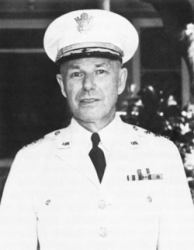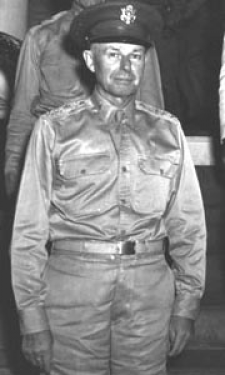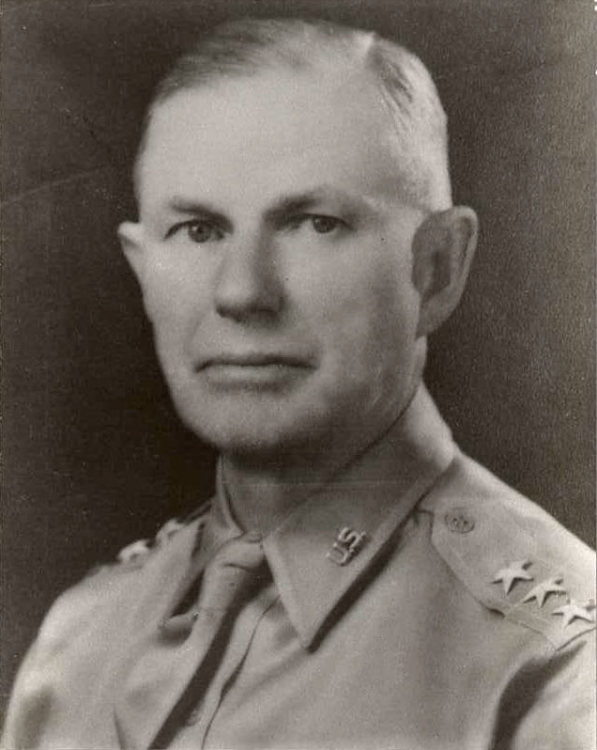
 |
|
|
||
|
Walter Campbell Short |
||||
|
Engagements: • World War I (1914 - 1918)• World War II (1941 - 1945) |
||||
| Biography: | ||||
|
Walter Campbell Short Walter Campbell Short was born on 30 March 1880 in Fillmore, IL. The son of a doctor, he graduated from the University of Illinois in 1901. Short was commissioned a Second Lieutenant in the U.S. Army on 13 March 1902 and assigned duty at the Presidio of San Francisco. He served in the Philippines and Alaska, and later took part in the Poncho Villa Expedition into Mexico with the Sixteenth Infantry in 1916. During World War I, he served on the General Staff of the 1st Division and as Assistant Chief of Staff for the 3rd Army. After WWI, Short became a member of the War Department General Staff and served with the Far Eastern Section of the Military Intelligence Division until 1924. He then attended the Army War College and after graduation served as a Staff School Instructor. Short commanded the 1st Division at Fort Hamilton, NY, from 1938-40 before commanding the 4th Army Corps and the 1st Army Corps. General George Marshall appointed him to the Hawaiian Command on 8 February 1941. He earned the Distinguished Service Medal and was considered to have had a successful career at that time, especially in light of his promotions during peace time. The Attack on Pearl Harbor On 17 December 1941, General Short was removed from command of Pearl Harbor as a result of the Japanese attack. Short was ordered back to Washington, DC, by Army Chief of Staff George C. Marshall in disgrace. He was reduced in rank from his temporary rank of Lieutenant General to his permanent rank of Major General, since his temporary rank was contingent on his command. Roberts Commission A commission headed by U.S. Supreme Court Associate Justice Owen J. Roberts, known as the Roberts Commission, was held soon after the attack on Pearl Harbor. Short, along with Navy commander, Admiral Husband E. Kimmel, was accused of being unprepared and charged with dereliction of duty. The report charged that he and Kimmel did not take seriously enough an earlier war warning and did not prepare for an air attack at Pearl. In a letter of 24 January 1941, Secretary of the Navy Frank Knox advised the Secretary of War, Henry L. Stimson, that the increased gravity of the Japanese situation had prompted a restudy of the problem of the security of the Pacific Fleet while in Pearl Harbor. Knox wrote: "If war eventuates with Japan, It is believed easily possible that hostilities would be initiated by a surprise attack upon the fleet or the naval base at Pearl Harbor." The letter proceeded: "The dangers envisaged in their order of importance and probability are considered to be: (1) Air bombing attack (2) Air torpedo plane attack, (3) Sabotage, (4) Submarine attack, (5) Mining, (6) Bombardment by gunfire." Knox's letter stated the defenses against all but the first two were then satisfactory, described the probable character of an air attack and urged the Army to prepare for such an attack. It concluded with recommendations for the revision of joint defense plans with special emphasis on the coordination of Army and Navy operations against surprise aircraft raids. It also urged the conduct of joint exercises to train the forces to meet such raids. On 7 February 1941, Stimson replied that a copy of the letter was being forwarded to Short, with direction to him to cooperate with the local naval authorities in making the suggested measures effective. Kimmel and Short received copies of these letters at about the time they assumed the commands. The report found that had orders been complied with: the aircraft warning system of the Army should have been operating: the distant reconnaissance the inshore air patrol of the Army should have been maintained; the anti-aircraft batteries of the Army should have been manned and supplied with ammunition: and a high state of readiness of aircraft should have been in effect. None of these conditions was in fact inaugurated or maintained for the reason that the responsible commanders failed to consult and cooperate as to necessary action based upon the warnings and to adopt measures enjoined by the orders given them by the Chiefs of the Army and Navy commands in Washington. The Roberts Commission was not a court-martial proceeding or a judicial tribunal. Rather, the investigations were for fact-finding. There is generally no right to "due process" in the sense of a right to counsel and to cross-examine witnesses at a fact-finding investigation. Short's Defense In 1946, Short testified on his own behalf before Congress about the 1941 attack. Unlike some of his predecessors in Hawaii, Short was more concerned with sabotage from Japanese-Americans on Oahu, and this led to Army planes being parked in such a way as to make them more vulnerable to aerial attack. In explaining his reasons for his instituting an alert against sabotage only, Short has stated: that the alert message he received on 27 November contained nothing directing him to be prepared to meet an air raid or an all-out attack on Hawaii; that he received other messages after the 27 November dispatch emphasizing measures against sabotage and subversive activities; that the dispatch was a "do-don't" message which conveyed to him the impression that the avoidance of war was paramount and the greatest fear of the War Department was that some international incident might occur in Hawaii which Japan would regard as an overt act; that he was looking to the Navy to provide him adequate warning of the approach of a hostile force, particularly through distant reconnaissance which was a Navy responsibility; and that instituting higher level alerts would have seriously interfered with the training mission of the Hawaiian Department. He also declared that he did not receive adequate warning and suffered from lack of resources. He and his family attempted to get the Army to restore his rank of Lieutenant General in the retired ranks on the basis that warnings from the War Department prior to the attack were vague and in conflict. He requested but did not receive a formal court-martial. Controversies over Findings On 25 May 1999, the U.S. Senate passed a resolution exonerating Kimmel and Short in a 52 to 47 vote. The resolution stated they had performed their duties "competently and professionally" and that the Japanese attacks were "not a result of dereliction of duty." "They were denied vital intelligence that was available in Washington," said Senator William V. Roth Jr. (R-DE), noting that they had been made scapegoats by the Pentagon. Senator Strom Thurmond (R-SC) called Kimmel and Short "the two final victims of Pearl Harbor." Admiral William Harrison Standley, who served as a member of the Roberts Commission, later disavowed the report maintaining that "these two officers were martyred" and "if they had been brought to trial, both would have been cleared of the charge." Robert Stinnett, in his book Day of Deceit (2000), claims that Kimmel and Short were deliberately kept out of the information loop, at least indirectly, on the specific orders of FDR. Stinnett's claims have been disputed by other historians, with a reviewer in the Journal of Military History characterizing Day of Deceit as "a bad book ...[that] relies on distortion and ignorance to fabricate a case". General Short retired from active duty on 28 February 1942 with the permanent rank of Major General. In Retirement After retiring from the Army, he headed the traffic department at a Ford Motor Company plant in Dallas. He retired in 1946. Portrayals Short was portrayed by actor and World War II veteran, Jason Robards, in the 1970 film Tora! Tora! Tora! which was made by American and Japanese filmmakers. In that film, the story balances out his fighter arrangement blunder with his prudent efforts of installing radar stations that could have warned the base of the attack had their detection of approaching Japanese aircraft been heeded. Death and Burial Major General Walter Campbell Short died on 3 September 1949 in Dallas, TX, of a chronic heart ailment. He is buried at Arlington National Cemetery in Arlington, VA. His headstone contains the rank of Lieutenant General. |
||||
| Honoree ID: 3078 | Created by: MHOH | |||
Ribbons
Medals
Badges
Honoree Photos
 |  |  |
 |  |
 |


